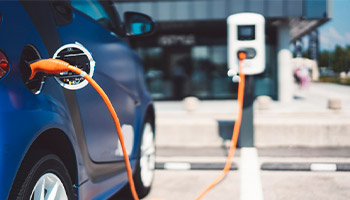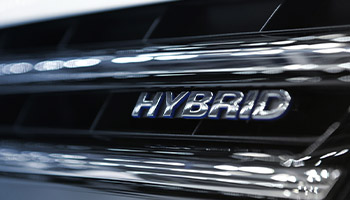If you are considering purchasing a new car, high gas prices may have you researching options that require fewer—or zero—trips to the gas station. According to a Pew Research Center survey, about 38% of American respondents say they are very or somewhat likely to consider an EV for their next car purchase. But how do you decide on your ideal model, and what are your charging options? Plus, what’s the difference between electric cars and hybrids? Here are some pros and cons of hybrids vs. electric vehicles to help you decide which is best for you.
Key Takeaways
- Electric vehicles are fully electric automobiles that rely on batteries and do not have an internal combustible engine. These vehicles have zero tailpipe emissions.
- Hybrids and plug-in hybrids feature a dual power system with an electrical battery and an internal combustible engine.
- Tax incentives and state rebates may be available for new purchases of specific EV and PHEV models.
Hybrids vs. Electric Vehicles: What’s the Difference?
If you’re in the market for an EV or a hybrid, you’ll quickly see that there are a variety of different vehicles that fall into these categories. Although many may be similar, there are a few key differences that could mean more to some than others. The three main types of vehicles we’ll be covering are electric vehicles (EVs), hybrids (HEV), and plug-in hybrids (PHEV).

Electric Vehicles (EV)
An electric vehicle is a fully electric automobile that relies on rechargeable batteries for power. EV batteries are typically charged using one of three plug-in charging methods, which are the only power sources available. EVs are zero-tailpipe emission vehicles because they do not have a combustible engine, nor do they burn any fuel. However, the energy used to charge an EV may come from a power plant fueled by natural gas, oil, or coal.
Hybrids (HEV)
As the name suggests, hybrid vehicles are both electric and gas-powered automobiles. Unlike EVs, hybrids contain an internal combustion engine and one (or more) electric motors that store energy in batteries. Standard hybrids do not need to be plugged into a power source to charge their batteries. Instead, hybrids use regenerative braking and the internal engine to produce electrical power. Because hybrids have an engine, they are not zero-tailpipe emission vehicles.
Plug-in Hybrids (PHEV)
Just like standard hybrids, plug-in hybrids are both electric and gas-powered automobiles. However, the key difference between the two is the addition of a charging port on PHEVs. Because of this, PHEVs have a larger battery that can store more electrical energy than a standard hybrid. These vehicles rely on regenerative braking and a combustion engine to charge the battery while the car is in motion. PHEVs act as a bridge between EVs and standard hybrids.
Pros and Cons of Hybrids and Plug-in Hybrids

Pro: Improved Fuel Economy Without Major Change
Both hybrids and plug-in hybrids will help reduce the amount of money you spend on fuel compared to a standard gas-powered vehicle without having to commit to a major change. For example, the Toyota Prius has an EPA-estimated 57 miles per gallon combined fuel economy rating. Although plug-in hybrids can be connected to a power source, it isn’t fully required to operate the vehicle due to its internal engine.
Pro: Don’t Have to Worry About Running Out of Power
One of the best advantages of hybrids is their dual power system. Since all hybrids can run on fuel and electrical power, you won’t have to worry about getting stuck on the side of the road without a charge. Although EVs do have substantial range limits, having the option of both power sources may be a better choice for someone who is purchasing their first electrical vehicle.
Pro: PHEVs Have Enough Power for Small Commutes
Depending on the model, most PHEVs will have electrical ranges between 25 and 35 electrical miles. If you have a shorter commute, a plug-in hybrid could be a worthy purchase that’ll help you save on fuel costs. Additionally, if you can charge your vehicle while at the office, you may be able to rely on electrical power for most of your regular commute.
Con: Hybrids Still Utilize an Internal Engine
Although hybrids have lower emissions than traditional gas-powered vehicles, they aren’t zero-tailpipe emission vehicles because they burn some form of fuel. If owning a car that has a low environmental impact is important to you, hybrids may require some compromise compared to an EV.
Con: Engine Maintenance
Since hybrids contain a combustible engine, you must service them accordingly. This includes regular oil changes, replacing engine belts, and additional maintenance requirements that come with a gasoline engine. Plus, you’ll also have the car’s electrical components to worry about.
Pros and Cons of Electric Vehicles
Pro: EVs Come with Less Maintenance
Although some maintenance may be required eventually, you can say goodbye to routine oil changes and other service requirements after purchasing an EV. EVs don’t have an internal combustion engine, so they do not need to follow the same service schedules as their gas-powered counterparts.
Pro: EVs Can be Cheaper to Power

In most cases, it is cheaper to charge EVs at home than it is to visit the gas station. How much you save will depend on where you live and the kind of charging equipment you use daily.
For example, the average cost of electricity in California is around 19.65¢ per kilowatt hour (kWh). At this price, charging an EV with a 65-kWh battery and a 259-mile range will cost you $12.77, or 4.93¢ per mile. To compare, it’d cost you $55.24 to go a similar distance in a 25-mpg gas vehicle at a gas price of $5.33 per gallon—the average fuel cost in California at the time of this writing.
Pro: EV Tax Credits
Owning an EV can come with additional benefits other than skipping the gas line. Depending on your model, you can earn up to $7,500 in federal tax credits for purchasing a new EV. For used EV purchases, the maximum credit is $4,000. Eligibility depends on where your vehicle was made and adjusted gross income. Some plug-in hybrids may qualify for these incentives, too. On a state level, some states, such as California, offer additional rebates depending on your vehicle.
Pro: No Tailpipe Emissions
If owning a car with a low environmental impact on the road is important to you, then an EV is just what you need. Since they don’t burn any fuel, fully electric vehicles come with zero tailpipe emissions.
Con: Limited Range
Although most EVs will have driving ranges comparable to gas-powered vehicles, you don’t have the same refueling options. With an EV, you can’t stop by one of the thousands of gas stations in your state. Instead, you’ll have to plan your route to ensure there are charging stations you can stop at before you run out of power. More and more charging stations are built yearly, but it could take time before the infrastructure is fully comparable.
Con: Not Many Affordable Options
Car prices have soared for all types of vehicles over recent years, and EVs are no different. Due to their technology, EVs are typically more expensive than their gas counterparts. Although there are a few entry-level EVs that don’t come with a hefty price tag, such as the Nissan Leaf or Chevrolet Bolt, these will still cost you around $28,000 for basic models.
Con: Longer Charging Times
How long it takes to charge your EV will depend on the type of charger that you use. For at-home charging, the fastest speed currently available is around 25 miles per hour of charge using a level 2 charger. Level 1 chargers will provide about 5 miles per hour of charge. Fast charging stations can provide up to 250 miles per hour, but you cannot install these stations in a home due to their major power requirements.
What About Auto Insurance?
As we can see, there are plenty of ways to introduce electric power in your daily commute. Whether you decide on a fully electric vehicle or ease into the transition with a plug-in hybrid, there are plenty of factors to consider. But what about auto insurance? Is it more expensive to insure an EV or hybrid? Purchasing insurance for an electric vehicle or hybrid is the same as purchasing insurance for a gas-powered car. However, a key difference is cost.
In most cases, it will cost more to insure an EV due to their higher cost and expensive parts. Although EVs don’t have engines, the parts they do have can be costly to replace and require specialized labor. All of these factors can result in higher payouts for insurance companies after a claim, which results in higher rates for policyholders. However, you will still have access to most insurance discounts for being a good driver, bundling policies, or being claim-free.
If you’re considering purchasing a new vehicle, we recommend speaking with an insurance specialist to understand how the change may affect you. At AIS, we have over 55 years of experience helping our customers navigate the insurance marketplace and find policies that work best for them. To speak with one of our specialists, give us a call at (888) 772-4247.
The information in this article is obtained from various sources and is offered for educational purposes. Furthermore, it should not replace manuals or instructions provided by the manufacturer or the advice of a qualified professional. No warranty or appropriateness for a specific purpose is expressed or implied.


